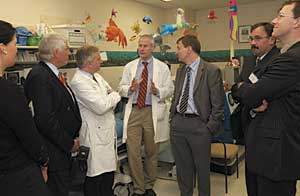Vital Signs:
Cancer Center hosts visitors from top German cancer center
In June, a group of renowned German cancer scientists made a visit to Dartmouth's Norris Cotton Cancer Center. The group had been charged with establishing Germany's first comprehensive cancer center (CCC), and they'd selected Norris Cotton as their model.
The visitors represented two organizations: Deutsches Krebsforschungszentrum (DKFZ), an internationally recognized research institute, and the University of Heidelberg, one of the oldest and most highly regarded German universities and medical schools. Their aim in forming a CCC is to provide a kind of oncological patient care new to Germany and a new foundation for translational research—creating a partnership under one roof between DKFZ and the university medical center.
Objectives: According to Dr. Mark Israel, Norris Cotton's director, the visit had two objectives: to show the Germans how an American cancer center is organized and where the areas of greatest challenge are, and to begin the process of building personal interactions between leading scientists there and investigators and physicians here.
 Photo by Jon Gilbert Fox |
| Several German visitors listen intently as white-coated DMS faculty members Jay Buckey, right, and Eugen Hug, left, explain the integration of hyperbaric and radiation therapies at Dartmouth's Norris Cotton Cancer Center— one example of work at a comprehensive cancer center. |
"We're expecting a lot to come out of this," said Israel at the end of the Germans' visit. "Numerous e-mail addresses and telephone numbers have been exchanged. That was really my goal—not only to help them, but also to create this personal contact that would lead to future interactions."
The visit was a tightly scheduled two days of presentations, discussions, tours, and group meals. According to Dr. Hans- Ulrich Kauczor, head of DKFZ's radiology department, the visit was a success. "It was wonderful. Very busy. We learned a lot about how the comprehensive cancer center is set up. Most important for us was to see how you are trying to initiate the collaboration between clinicians and research scientists."
Protocols: Dr. Volker Diehl, the acting head of the new CCC, noted that currently in Germany each researcher has his or her own protocols. "I think for the sake of the patients, it is extremely important to have common protocols so the patients get the best treatment," he said during the visit. "People here [in the U.S.] like to work together. That is not true in Germany."
Diehl has known Israel for some years and has visited Dartmouth before. It was Diehl's decision to use Norris Cotton as a model. "We are enchanted by the friendliness and the high scientific standard," he noted. "We are very happy to be here."
The visit concluded with closing presentations over a working lunch. While the group munched on cold cuts and salad, Dr. Andrew Gettinger, whom Israel introduced as the inspiration and brains behind DHMC's electronic patient information and record system, gave the group a virtual tour of these systems. "The information needs to be available where it's needed," said Gettinger, noting that most physicians use laptops to enter and retrieve data. German heads nodded vigorously.
How expensive are the computers, they wanted to know, and how do you control access? Gettinger responded that the system was restricted by an internal name-recognition device. "Ah, like an internal firewall," said Dr. Otmar Wiestler, chair of the DKFZ management board. "Exactly," responded Gettinger. In the international language of computers, jargon such as "firewall," "reboot," and "IP" needed no translation.
Knuckles: As Gettinger concluded his presentation, the visitors rapped their knuckles appreciatively on the table—a tradition in Germany.
Israel then invited Dr. Wiestler to give an overview of the progress to date in Heidelberg. Wiestler pulled out an Apple PowerBook and fired up a Powerpoint presentation entitled "Comprehensive Cancer Center —NCT Heidelberg."
At the core of their venture is interdisciplinary oncological care—including central monitoring of data, interdisciplinary tumor boards, and centralization of information and counseling. The concept of shared governance, noted Wiestler, will perhaps be their toughest sell. As Israel gave advice on how to structure the governance of this new entity, Wiestler moved boxes around on his electronic organizational chart. "There is fierce competition for funding," explained Wiestler. "Forging collaborative partnerships will not in all cases be easy."
"First we want to bring the partners together," said Dr. Josef Puchta, administrative chairman of the DKFZ management board. "Maybe in a few years we will come under one legal structure."
"I think you're destined for success," commented Israel.
"We will do it. That's for sure," asserted Puchta.
"We have learned a lot," added Wiestler. "I think in the not-too-distant future, we should have you in Heidelberg." As Wiestler shut down his Power- Book, the Americans initiated a round of enthusiastic knuckle-rapping.
"This is something we should borrow," declared Ralph Czachowski, the director of financial services for Norris Cotton, as the visitors and their hosts filed noisily from the room.
Katharine Fisher Britton
If you would like to offer any feedback about this article, we would welcome getting your comments at DartMed@Dartmouth.edu.
